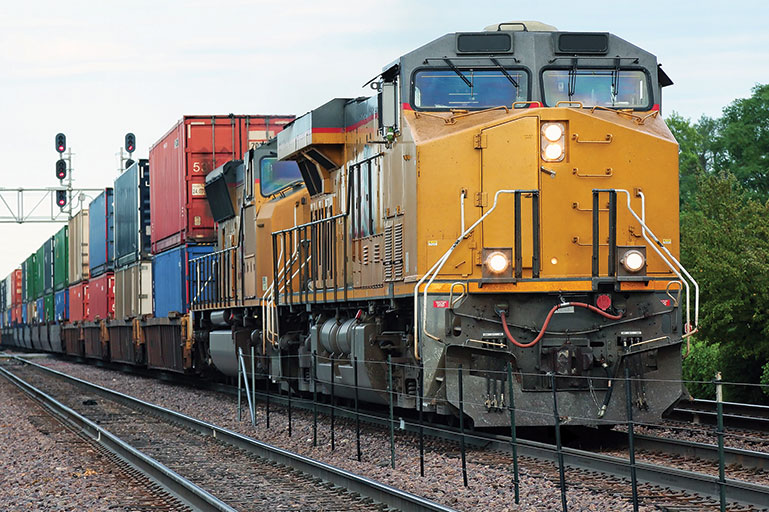President Biden calls on Congress to aid in settling railroad differences
As the clock ticks towards December 9, the end of the status quo, or “cooling off” period, for the four remaining railroad labor groups yet to ratify the terms of the tentative agreements with United States-based Class I freight railroad carriers, President Biden yesterday called on Congress to pass legislation to “adopt the Tentative Agreement between railroad workers and operators—without any modifications or delay—to avert a potentially crippling national rail shutdown.”
As previously reported, these agreements are based on recommendations made by Presidential Emergency Board (PEB) appointed by President Biden, which were released on August 16, and include a 24% wage increase over the five-year period from 2020 through 2024, coupled with a 14.1% wage increase that is effective immediately, as well as five annual $1,000 lump sum payments, with the National Carriers’ Conference Committee (NCCC), an organization representing the nation’s freight railroads in national collective bargaining, noting that a portion of the lump sum payments are retroactive and will be paid out promptly upon ratification of the agreements by the unions’ membership. A major source of contention between the unions yet to ratify this agreement and the freight railroads focuses on sick leave and shift scheduling, as well as staffing shortages and related issues.
Currently, eight of the 12 railroad labor groups have ratified terms of the tentative agreement. The holdovers include: Brotherhood of Railway Signalmen (BRS), the last union yet to ratify terms of the tentative agreement, joining SMART-TD (for one of its contracts), BMWED (Brotherhood of Maintenance of Way Employees Division of the International Brotherhood of Teamsters), and IBB (Iron Ship Builders, Forgers and Helpers).
President Biden did not hold back in highlighting the potential economic damage a strike may cause.
“Let me be clear: a rail shutdown would devastate our economy,” he said. “Without freight rail, many U.S. industries would shut down. My economic advisors report that as many as 765,000 Americans—many union workers themselves—could be put out of work in the first two weeks alone.”
What’s more, Biden added that during the ratification votes, the Secretaries of Labor, Agriculture, and Transportation have been in regular touch with labor leaders and management, noting the respective Secretaries “believe that there is no path to resolve the dispute at the bargaining table and have recommended that we seek Congressional action. And he noted that while some members of Congress want to modify the terms of the tentative agreement, with the objective to improve it for labor or management, that any changes made “would risk delay and a debilitating shutdown,” as “the agreement was reached in good faith by both sides.”
Many industry organizations have chimed in as well, making the case for this situation to reach a positive outcome.
The Association of American Railroads (AAR) has repeatedly made the case for the need for the sides to come to terms, pointing to its September report, stating that a strike could cost the U.S. economy $2 billion per day.
“No one benefits from a rail work stoppage – not our customers, not rail employees and not the American economy,” said AAR President and CEO Ian Jefferies. “Now is the appropriate time for Congress to pass legislation to implement the agreements already ratified by eight of the twelve unions. A clear pattern of ratified agreements has been established and Congressional action to prevent a work stoppage in this manner is appropriate. These agreements will ultimately boost average employee compensation and benefits to more than $160,000.”
National Retail Federation (NRF) President and CEO Matthew Shay said that a rail strike, coupled with historically high levels of inflation, could wreak financial havoc and inflict catastrophic harm to American businesses, workers, consumers and the U.S. economy.
“We are in peak holiday shopping season, and it is essential that retailers and other businesses are able to rely on these vital supply chain partners,” he said. “Retailers echo President Biden’s call for Congress to take immediate action to avert a rail strike and implement the tentative agreement brokered between the labor unions and freight railroads earlier this year.”
Support for labor accord on the railroads was also offered up by the American Trucking Associations (ATA).
“ATA calls on Congress to act immediately to resolve this looming issue,” said ATA President and CEO Chris Spear. “Further delays only result in more uncertainty and inflationary pressure at a time when the economy is straining under the weight of both. Trucking is not alone in calling on Congress to act immediately—hundreds of organizations and President Biden have all also urged lawmakers to end this stalemate.”
ATA officials added that railroads are planning to stop taking hazardous materials—including fuel—next week. They said that with national fuel supplies, especially diesel, in short supply throughout numerous parts of the country, the trucking sector cannot afford any disruption to our nation’s supply chain that a potential rail strike would create.
“Hospitals, businesses and ordinary Americans depend on freight rail and trucking for daily necessities, and the trucking industry has neither the equipment nor the manpower to replace a single day of lost freight rail service,” they said. “Truck transportation and railroads are much more complements than substitutes—there is no way the trucking industry can replace all the rail freight.”
With one week to go until the December 9 deadline, time is truly of the essence, in order to get a deal done. The White House and respective industry organizations have made their positions clear, while the freight railroad carriers and unions have appeared to dig in and are set on their respective positions. At a time of highly-divided government, Congress needs to step in and get a deal across the finish line. Partisanship needs to take a seat in the caboose in the name of economic security and a fluid supply chain.













